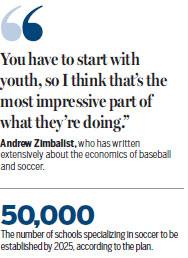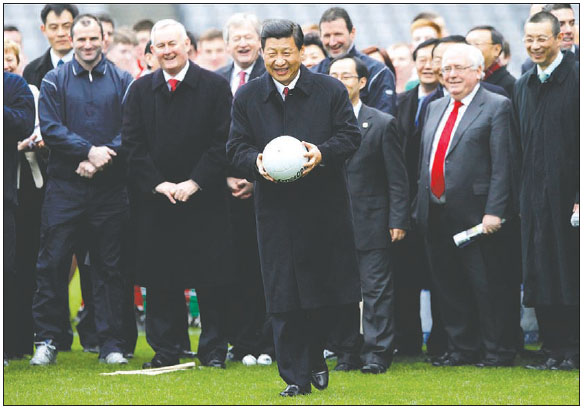China's plan to move from being 83
Updated: 2015-03-20 11:07
By Jack Freifelder(China Daily)
|
||||||||
China has the money, the population and a dedicated fan base for a world-class soccer team, but it doesn't have one. That may change with the country's unveiling of a plan this week to eventually get that team, JACK FREIFELDER reports from New York.
One number can be used to summarize the woeful story of the sport of soccer in China: 83.
That's the current global ranking for the country's national men's team by the International Federation Association of Football, the sport's governing body.
China's men's team has entered the World Cup finals only once, in 2002 when jointly held by Japan and South Korea in their countries. The team didn't score a goal.
The women's team has done much better. It finished second in the 1999 World Cup and now ranks 13th in the world, down from the Top 10 a decade ago.
Germany is No 1 in FIFA's men's and women's rankings.
But President Xi Jinping, who is widely known as an avid soccer fan, is looking to move to the top of those rankings.
Xi launched a reform roadmap for the sport in February, and on Monday the State Council, the country's cabinet, unveiled a detailed plan. The goal: make China a soccer powerhouse and eventually host the World Cup tournament.
A big emphasis in the plan is to get the country's youth involved by expanding soccer education and playing at schools and universities. More than 5,000 elementary and middle schools in China now provide soccer coaching. The plan aims to make that number reach 50,000 by 2025 with the goal of producing more than 100,000 players.
New soccer fields are to be constructed; from schools to corporations, all organizations are being encouraged to set up their own soccer teams and to stage amateur games at multiple levels.
The plan also calls for cleaning up a sport that has been riddled with corruption, from bribery to match-fixing and gambling scams.
It would move the sport from the state sports body's administration to an independent league council of club owners and a Chinese Football Association representative to operate and manage leagues at all levels.
There are initiatives for the national team, including investing more on training, logistical support and building two more training bases.
A doable plan?
Will the plan eventually make China a soccer powerhouse?
"I definitely think that it's a reachable goal. They've already succeeded with their women's team, and I don't see any reason why their men's team can't improve markedly in the coming years," said Andrew Zimbalist in a telephone interview. A professor of economics at Smith College in Northampton, Massachusetts, Zimbalist has written extensively about the economics of baseball and soccer.
"They have the command of resources to do that and soccer utilizes relatively fewer resources than other sports because all you need is a ball and a field to play soccer. You don't need basketball nets, helmets, bats or gloves, so it's a pretty easy game to spread. I think that's one of the reasons why it's the world's most popular sport because it spreads so readily," said Zimbalist, who this year wrote the book Circus Maximus: The Economic Gamble Behind Hosting The Olympics and World Cup.
Zimbalist said the youth initiatives in China's reform plan are the most important: That's the way you build a sport in the long run. You have to start with youth, so I think that's the most impressive part of what they're doing."
As for hosting the World Cup, "I think it's realistic," he said.
Zimbalist said the sites for the World Cup are set through 2022 "and FIFA might be a little cautious about who they give the game to in 2026 after giving it to Russia and Qatar. I don't see it for 2026, but after that I don't see why it wouldn't be a viable option."
John Nauright, a professor of sport and leisure cultures at the University of Brighton in England, said there is no reason why China should not be more successful in international football.
"South Korea and Japan have had considerable success with much smaller populations and the level of football in those countries grew dramatically between the early 1980s and mid-1990s. Australia, the current champions of Asia, invested in high performance and youth coaching 20 years ago and it has paid off. Australia's entire population is roughly equal to that of Shanghai or Beijing, and football there is one of several codes vying for prominence," he wrote in an e-mail.
"With a massive capital base, huge human resources to draw upon and a willingness to succeed there is no reason China cannot be a leading football power in Asia and ultimately globally."
Cameron Wilson, founding editor of Wild East Football, a website on Chinese football, said China "has something of a job on its hands to improve its football system."
"The new plan is rightly ambitious, and clearly a lot of effort has been expended to introduce these new measures. But implementation and achieving any tangible gains are still several steps down the road," he said in an e-mail.
"It will take 100 times more work to actually implement it, and even more still to get significant results out of it."
Foreign players
Cameron noted that the quality of the foreign players going to China has been on a "strong upward spiral" in recent years.
"Players such as Didier Drogba, Dario Conca and Tim Cahill are of a very high standard, and of better technical ability than domestic players," Wilson wrote. "There is no doubt of their positive influence on the development of Chinese football players."
And he added that "big name foreign players are not the long term solution. China needs to develop its own [game]."
Rowan Simons, chairman of China ClubFootball FC, the first amateur football network in China with foreign interests, said the performance of China's national teams has "always been important," but the plan announced this week by China's State Council "elevates football to more than just a sport".
"Achieving success in football is now a national objective and this is something seldom seen in the world," Simons told China Daily.
He said many of the goals laid out by China's cabinet "are achievable" but some "big questions" remain.
"The plan is filled with sensible instructions that are all basic actions that China must address if football is to flourish," he wrote in an e-mail. "It is easy to say that the number of football schools will rise from 5,000 to 20,000, but much harder to build the entire grassroots infrastructure around those schools. It is in this area that ClubFootball specializes."
Established in August 2001, China ClubFootball promotes the sport of soccer by hosting training events and summer skills camps for Chinese youth and adults interested in learning about the game.
The Chinese Football Association (CFA) and the Beijing Administration of Industry and Commerce also license the group's activities.
Simons, who is the author of the March 2009 book, Bamboo Goalposts: One Man's Quest to Teach the People's Republic of China to Love Football, said the growth in the professional leagues is certainly a positive factor. But importing top-flight players and coaches is not a prerequisite to helping the Chinese national team, he said.
"The plan talks about building lasting club brands and promises to end the crazy practice of team names changing with the sponsor," Simons told China Daily. "Improvements are being driven by the need to perform well on the pitch. After years where victory was not necessarily the objective, this is a very encouraging development."
Some clubs are even beginning to mimic Europeans clubs in some marketing and promotional efforts, he said.
"These are all essential components of a thriving football industry, but they cannot produce national team success," Simons wrote. "For that long-term goal, there first needs to be a massive increase in the population of young players receiving professional coaching and regular challenging competition.
True football fan
"Many clauses in this landmark document get the issues and solutions absolutely right, so President Xi has confirmed his credentials as a true football fan," Simons wrote. "For the first time, we have a central football edict, a working blueprint that reflects not just the popular feeling, but also the sentiments and best advice of those who are most deeply involved in the game."
Simons said he was also encouraged by the government including national team achievements in the short, medium and long-term goals of the plan.
"By 2025, if the CFA is a real football association and millions have embraced football's positive social values by participating in their local clubs, then we will be on the road to success," Simons wrote.
Wilson said soccer in China has been "improving slowly" over the past few years, but the scale of the new plan shows "the powers-that-be are aware of the vast amount of work" that still needs to be done at the grassroots level.
"China needs more kids playing football more often, they need more places to play, and better coaching personnel and systems," Wilson wrote.
One factor that has also hurt the game in China has been frequent changes in team ownership, a move that has often led clubs to change their name or relocate when a new sponsor comes along, Wilson told China Daily.
"At top level, the Chinese league needs to learn to put fans first by respecting the traditions of their clubs and not changing the names and home city of teams every other year," he wrote. "This makes it impossible to build up proper football culture."
"Even the most successful team, Guangzhou Evergrande, changed its name at the start of this season, adding Taobao to the end," Wilson wrote. "Who knows what they will be called next year?"
Nonetheless, Wilson said he's glad to see the plan for soccer growth in China promoting the development of historic clubs.
"Chinese kids want to watch Manchester United and Barcelona because they have built big followings based on keeping a constant identity over the years," he wrote. "These are teams with a proud history".
"According to FIFA's own statutes, national football associations must be run fully independent from their respective national governments," Wilson wrote. "This is done to give national football associations the independence and power to govern the game in the best interests of football development in each country, and to safeguard them from government meddling or manipulation."
"China's FA has never been independent of government, yet FIFA has never suspended or taken any action against the Chinese FA," he wrote.
Simons said the announcement of China's plan to create a separate governing body for soccer, in lieu of remaining under the jurisdiction of the national sports administration, is a "historic statement" of China's intentions to promote the game of soccer.
"If this particular reform is truly implemented, it will create a CFA in which the stakeholders can lay down long-term foundations," he wrote.
Contact the writer at jack freifelder@chinadailyusa.com
|
Then Vice-President Xi Jinping prepares to kick a Gaelic football during a visit to Croke Park Stadium in Dublin, Ireland, in February 2012. Xinhua |

(China Daily 03/20/2015 page20)

 How much do world leaders earn?
How much do world leaders earn?
 Daredevil ropejumpers leap 200 meter off cliff
Daredevil ropejumpers leap 200 meter off cliff
 Harley motorcade shows up in Boao, Hainan
Harley motorcade shows up in Boao, Hainan
 Ming art sets Christie's high
Ming art sets Christie's high
 Stolen-phone bromance blossoms in China
Stolen-phone bromance blossoms in China
 Prince Charles, Camilla get royal tour of Washington
Prince Charles, Camilla get royal tour of Washington
 Should selfie sticks be banned?
Should selfie sticks be banned?
 Tunisians demonstrate against terrorism
Tunisians demonstrate against terrorism
Most Viewed
Editor's Picks

|

|

|

|

|

|
Today's Top News
Yahoo to exit from Chinese mainland market
US sends 'green' mission to China
Sticking it to the selfie stick
China's eco-friendly companies stand to gain
China's global image on rise
3 killed in shooting at California convenience store
More Chinese film companies tap into Hollywood
Microsoft tackles China piracy with free upgrade to Windows 10
US Weekly

|

|








